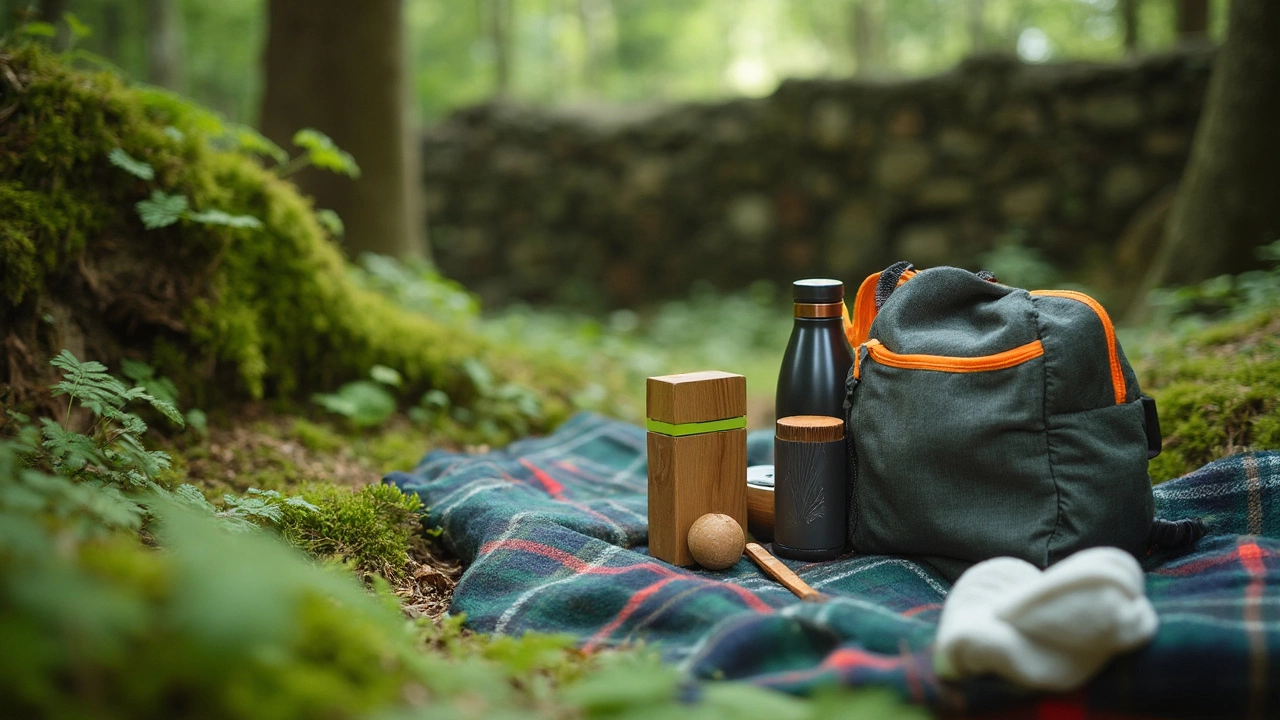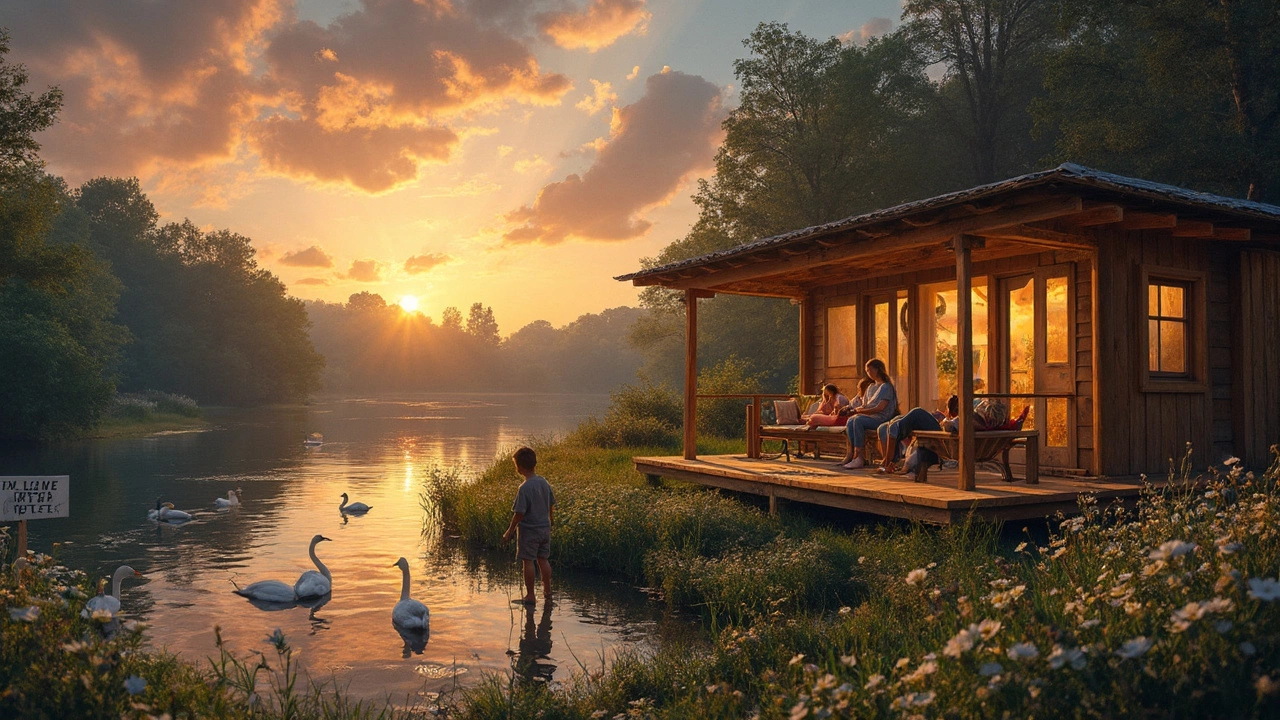The golden rule of camping is dead simple: leave the place better than you found it. Whether you're hiking out in the wild, pitching a tent, or staying at an eco-friendly cottage, this rule is your go-to guide. If you pick up after yourself—and even take an extra minute to collect a few scraps left by others—you’re already doing it right.
Think about this: Each year, careless campers leave over 100 million pounds of trash behind in U.S. parks alone. That’s enough to fill more than 2,500 garbage trucks. So imagine the difference you make just by packing out all your stuff and choosing reusable gear over the single-use kind. Even something small, like switching to a bamboo toothbrush or using a refillable water bottle at your cottage, adds up fast.
The golden rule isn’t only about litter, though. It’s about respecting nature—and everyone else who uses it after you. Don’t build huge fires in fragile spots, don’t trample over wild plants, and skip those noisy late-night parties that can scare off wildlife. All these choices stack up to help preserve that quiet, wild magic that makes camping (and eco-cottages) so special in the first place.
- What Does the Golden Rule of Camping Actually Mean?
- Why It Matters for Eco-Friendly Cottages
- Top Practical Tips You Can Use Right Now
- Common Mistakes Campers Make (And How to Dodge Them)
- A Quick Guide to Green Gear and Packing
What Does the Golden Rule of Camping Actually Mean?
The golden rule of camping is all about treating the outdoors with respect, which boils down to this: never leave a trace of your visit. If you camp, hike, or sleep in an eco-friendly cottage, leave nature as you found it—or even a bit better. This approach, called "Leave No Trace," started getting attention in the 1970s when the outdoor crowd and park rangers realized that trash, fires, and off-trail shortcuts were messing up parks fast.
At its core, this rule means a few clear things:
- Pack out everything: Every wrapper, bottle cap, or soggy marshmallow stick needs to leave with you. If you found it there, pack it out too.
- Don’t mess with nature: Skip the rock towers, tree carvings, or picking wildflowers. Those small acts stack up and damage the natural balance.
- Respect wildlife: Watch from a distance, don’t feed them, and lock up your snacks so curious raccoons don’t get into trouble.
- Keep things quiet and peaceful: Loud music and yelling disturb animals and ruin the vibe for other campers. Nature isn’t an outdoor concert; keep it chill.
- Choose reusable over disposable: Gear like reusable plates, bottles, and utensils beats single-use every time and fits right in with eco-friendly camping values.
Here’s a quick look at why following this rule matters. According to the National Park Service, almost 75% of park rangers say that litter and leftover fire pits are the most common complaints from campers. Following the golden rule helps reverse these problems—protecting the wild places you love for the next person, and all the ones after that.
Why It Matters for Eco-Friendly Cottages
Eco-friendly cottages have exploded in popularity, especially with people looking to unplug without trashing the planet. The golden rule of camping—leaving spaces better than you found them—matters even more in these spots. Most eco-cottages are built using renewable materials and run on solar, rainwater, or other green tech. But these efforts only pay off if guests actually play their part when visiting.
Let’s get real: running an eco-lodge on clean energy saves about 30% more carbon compared to regular hotels. But if visitors toss plastic bottles in the bushes or waste electricity, the whole point goes out the window. Cottage owners spend a good chunk of time reminding guests to sort trash, save water, and stay on trails for a reason. Hang your towels to dry, refill your water, and keep showers short—these aren’t just polite asks, they’re a must for keeping the cottage green.
- Water is precious. Most green cottages use rainwater tanks. Wasting water means less for everyone, especially during dry summers.
- Waste management is a real pain—especially in rural areas. Splitting up recyclables from trash is way harder when you’re off the grid.
- Wildlife counts on your good habits. Leaving food around attracts critters that don’t really belong near people, and it messes up the balance.
Here’s a quick look at why sticking to the eco-friendly camping mindset adds up:
| Eco-Friendly Routine | How It Helps |
|---|---|
| Using refillable bottles | Cuts about 150 single-use bottles per guest per week |
| Short showers | Saves up to 10,000 liters of water per cottage each season |
| Sorting food waste | Allows composting and keeps trash piles smaller |
So the next time you’re at a green cottage, think small: each habit—from flipping off the lights to tidying up—keeps the whole experience truly eco-friendly for everyone after you. This mindset is how these special places stay wild, beautiful, and open for your next visit.

Top Practical Tips You Can Use Right Now
Want to be a pro at following the golden rule of camping? Here are some solid, no-nonsense tricks you can actually use during your next stay at an eco-friendly cottage or out in the wild. These are things that really make a difference—not just for you, but for everyone else enjoying nature, too.
- Pack reusable stuff. Single-use items like plastic cutlery and paper plates pile up fast. Switch to a set of lightweight, reusable dishes, cups, and bamboo utensils. Did you know reusable water bottles cut down on over 38 billion plastic bottles that end up in landfills every year?
- Grab a trash bag before you go. Every group should have a trash bag handy. Use it for your own stuff—then keep going and pick up anything you spot at your site. Leaving things spotless matters way more than you think.
- Stick to the trails. Cutting across the grass or trampling through wildflowers might not seem like a big deal, but it damages fragile plants and soil. Thousands of new trails appear every year from this, and that’s bad news for nature.
- Go small with fires. Only build fires in designated fire rings or stoves. Big, wild fires are one of the top ways wild areas get scarred or, worse, go up in flames. In some places, even a cigarette butt can start disaster.
- Skip the soap in streams or lakes. Even “eco-friendly” soaps can mess up water systems. Go at least 200 feet from any water source to wash dishes or yourself, and make sure you use very little soap.
If you’re at a green cottage, use the compost bin if it’s there. Many eco-cottages make it easy to sort waste—just ask when you check in, and do your part to keep things sorted right.
| Eco Tip | Estimated Impact |
|---|---|
| Using reusable water bottles | Reduces up to 156 plastic bottles per person per year |
| Packing out all trash (and more) | Helps remove 1-2 pounds of litter per camper, per trip |
| Staying on trails | Prevents erosion in over 1,000 park sites annually |
Small steps stack up. Stick to these basics, and your trip checks all the boxes for real eco-friendly camping.
Common Mistakes Campers Make (And How to Dodge Them)
Even seasoned campers slip up sometimes, breaking the golden rule of camping without even realizing it. A lot of issues come from small things that snowball into big annoyances for nature and other campers. Here’s where people usually go wrong—and how to sidestep those blunders.
- Leaving Trash or Food Scraps Behind
It sounds obvious, but food wrappers, apple cores, or even coffee grounds are often left at campsites. Leftover trash attracts animals and can seriously mess with local ecosystems. Roll up everything you brought, even biodegradable bits. - Collecting Firewood on Site
Picking sticks from the ground might sound harmless, but it disrupts bugs and animals who rely on that wood. Bringing your own firewood—preferably local to avoid spreading pests—or using provided supplies is better. In some areas, collecting is even banned. - Cutting Through Campsites or Off Trail
The shortest route to the bathroom isn’t always the best. Cutting across fields or ignoring paths tramples fragile plants and starts unofficial trails. Always stick to marked paths, even if it means a longer walk. - Skipping Proper Campfire Safety
According to the U.S. Forest Service, over 85% of wildfires are started by humans, often from abandoned or poorly managed campfires. Always use official fire rings, keep them small, and drown, stir, and feel the ashes before heading out. - Noisy Nights
Loud music and late-night shouting can drive away wildlife for days and wreck the peaceful vibe everyone’s after. Keep noise low at night—even inside eco-friendly cottages—so neighbors and critters stay undisturbed.
Here’s a quick look at common camper mistakes and their impact:
| Mistake | Impact |
|---|---|
| Leaving food scraps | Attracts animals, spreads disease |
| Cutting new trails | Erodes soil, kills plants |
| Loud noise | Stresses wildlife |
| Improper fires | Can cause wildfires |
The fix? Prep before you go. Make a checklist of things to take home (trash, food, recyclables). Read up on the rules for your spot. Stick to eco-friendly camping routines, and check what you leave behind twice. A few extra minutes means a whole lot for the folks—people and animals—coming after you.

A Quick Guide to Green Gear and Packing
If you want to nail the golden rule of camping, start with your gear. Picking the right stuff can save you money, time, and keep your trip way more eco-friendly.
Go for reusable, durable options rather than single-use gear. A stainless steel water bottle will outlast hundreds of plastic bottles, and you won’t be adding to that mountain of trash. Grab a set of bamboo utensils, a lightweight mess kit, and a cloth grocery bag. For shelter, check if your tent or sleeping bag is made from recycled materials—more brands are focusing on sustainability now.
- Rechargeable headlamps or solar-powered lanterns are great for cutting down on disposable batteries.
- Biodegradable soap and toothpaste help keep wastewater safe for plants and animals around your site.
- Skip pre-packaged meals. Bring your own snacks in reusable containers to cut way back on plastic use.
- Pack clothes made from natural fibers like organic cotton, wool, or hemp—they break down in nature if they get lost, unlike synthetics.
- Try a home-made coffee kit instead of single-use coffee pods or instant packets—less packaging, less waste.
When it comes to packing, making a list helps you avoid overpacking and pointless extras. Pack only what you need, then double-check for any items that could leave trash behind. Did you know the average camper tosses around 4 pounds of waste on a weekend trip? That's a lot if you multiply it by millions of visitors each year.
| Item Type | Reusable Option | Trash Saved (Avg. per trip) |
|---|---|---|
| Water Bottles | Stainless/Glass | Up to 10 bottles |
| Coffee Cups | Insulated Reusable Mug | 5-8 cups |
| Cutlery & Plates | Bamboo or Metal Set | 10-20 sets |
It pays to check local recycling and compost rules at your eco-friendly cottage or campground. Some sites offer bins for different types of waste—don’t guess, ask!
Switching to green gear isn’t about being perfect, but every little step chips away at that massive waste problem. You’ll feel a lot better sipping coffee out of your sturdy mug knowing you’re actually helping the planet.